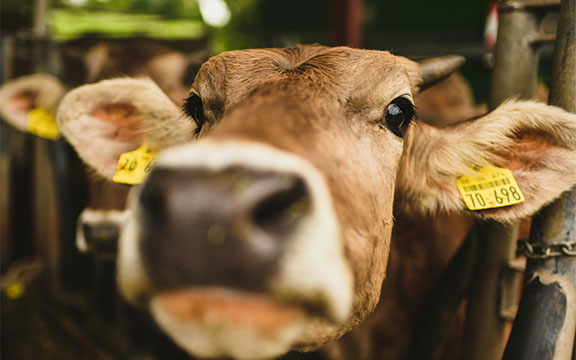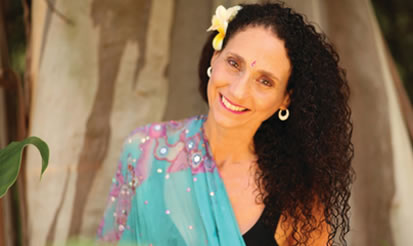
Photo by Chino Rocha courtesy of Unsplash.
Veganism and the Yamas: A Yogic Call to Compassion
Yoga is a path of transformation—one that extends far beyond the mat. It is a way of living that aligns our thoughts, words, and actions with our highest ideals. The eight limbs of Raja Yoga, as outlined by Patanjali, provide a roadmap for this journey. At the foundation of this system are the Yamas, ethical principles that guide how we relate to the world.
For many yogis, vegetarianism is an obvious step in practicing nonviolence. However, a deeper examination reveals that continuing to consume dairy products contradicts the very values at the heart of the Yamas. By exploring Ahimsa, Satya, Asteya, Brahmacharya, and Aparigraha, we can see that choosing a vegan lifestyle is not only an ethical choice but a natural extension of the yogic path.
Ahimsa: Nonviolence in Thought, Word, and Action
Ahimsa, the first and most fundamental Yama, teaches us to avoid causing harm to any living being. It is why many yogis adopt a vegetarian diet, believing that abstaining from meat prevents unnecessary suffering. However, the dairy industry is inherently violent.
Dairy cows are forcibly impregnated to keep them producing milk, only to have their calves taken away shortly after birth. The separation causes deep distress—both for the mother and her baby. Male calves, unable to produce milk, are often sent to slaughter for veal, while female calves are raised to endure the same cycle of exploitation. When we consume dairy, we participate in a system that inflicts pain and suffering on sentient beings. If we are committed to Ahimsa, can we truly justify this? Thankfully, there are now countless plant-based alternatives—nutritious, delicious, and cruelty-free. Shifting to a vegan diet is an act of nonviolence, an extension of our commitment to peace and compassion.
Satya: Living in Truth
Satya calls us to truthfulness—not only in speech but in how we live. It asks us to see reality clearly, even when it challenges our habits or beliefs.
Many of us grew up believing that dairy is necessary for health or that it is harmless. However, the reality is far different. The dairy industry causes suffering to animals, contributes to environmental devastation, and has serious health consequences, including links to heart disease, hormone imbalances, and increased cancer risk. When we continue to consume dairy despite knowing these truths, we contradict the principle of Satya. True integrity comes from aligning our actions with the realities we discover. As yogis, we strive to live in harmony with truth—even when it requires change.
Asteya: Non-Stealing
Asteya, or non-stealing, extends beyond material possessions. It includes not taking what is not freely given.
When we consume dairy, we take what belongs to another. A mother’s milk is intended for her baby, yet in the dairy industry, calves are deprived of their natural nourishment so that humans can consume it instead. Additionally, the environmental cost of dairy production steals resources from future generations. The vast amounts of land, water, and crops used to sustain dairy farming contribute to deforestation, water shortages, and pollution. By choosing plant-based alternatives, we respect the rights of all beings and honor our responsibility to the planet. In doing so, we live in alignment with the principle of Asteya.
Brahmacharya: Moderation and Self-Restraint
Brahmacharya is often interpreted as moderation—using energy wisely and making choices that bring balance. In the context of diet, it encourages us to consume food that nurtures both body and spirit.
The dairy industry thrives on excess—forcing cows into a relentless cycle of reproduction and milk production. This exploitation stands in stark contrast to the yogic ideal of balance and self-restraint. Moreover, consuming dairy contributes to imbalance within our own bodies, as it is linked to inflammation, digestive issues, and hormone disruption. By embracing a plant-based diet, we cultivate a sense of balance, choosing foods that nourish without harm. This is an expression of Brahmacharya in action.
Aparigraha: Non-Possessiveness and Letting Go
Aparigraha teaches us to release attachments—whether to material things, harmful habits, or outdated beliefs. Many of us hold onto dairy out of familiarity, comfort, or convenience, even when we recognize its ethical and environmental consequences.
Letting go of dairy is an opportunity to practice non-attachment, to make choices based on wisdom rather than habit. It is an act of freedom—freeing ourselves from participation in suffering and embracing a diet that reflects our deepest values.
Walking the Yogic Path with Integrity
The Yamas are not abstract concepts; they are principles meant to guide our daily lives. If we truly seek to embody Ahimsa, Satya, Asteya, Brahmacharya, and Aparigraha, then our dietary choices must reflect these ideals.
Fortunately, we live in a time where plant-based alternatives are abundant and accessible. Choosing a vegan lifestyle is not about restriction but about expansion—expanding our compassion, awareness, and alignment with the teachings of Yoga. As yogis, we have the opportunity to be a force for change, to make choices that uplift all beings. By embracing a diet rooted in kindness, we take another step toward living in harmony with the world—one meal at a time.
In Part 2, we will explore how the Niyamas—the observances that guide our inner life—also support the transition to a plant-based diet.
About the Author:
 Meenakshi Angel Honig is dedicated to peace and loving kindness. She has studied with one of the most highly revered and deeply loved Yoga Masters of our time, Sri Swami Satchidananda. Meenakshi is a certified Integral Yoga Instructor & Teacher Trainer with over 50 years of teaching experience and serves as the director of the Integral Yoga Center of Maui. Meenakshi Angel is a licensed minister and an animal rights advocate. She is a highly respected leader in promoting plant-based nutrition for individual and global well-being. She has produced 5 DVDs, 2 CDs and is the author of 11 books including, The Solution: 10 Compelling Reasons to Choose a Plant-based Diet & Lifestyle -The Why & The How. For more info, please visit her website.
Meenakshi Angel Honig is dedicated to peace and loving kindness. She has studied with one of the most highly revered and deeply loved Yoga Masters of our time, Sri Swami Satchidananda. Meenakshi is a certified Integral Yoga Instructor & Teacher Trainer with over 50 years of teaching experience and serves as the director of the Integral Yoga Center of Maui. Meenakshi Angel is a licensed minister and an animal rights advocate. She is a highly respected leader in promoting plant-based nutrition for individual and global well-being. She has produced 5 DVDs, 2 CDs and is the author of 11 books including, The Solution: 10 Compelling Reasons to Choose a Plant-based Diet & Lifestyle -The Why & The How. For more info, please visit her website.

